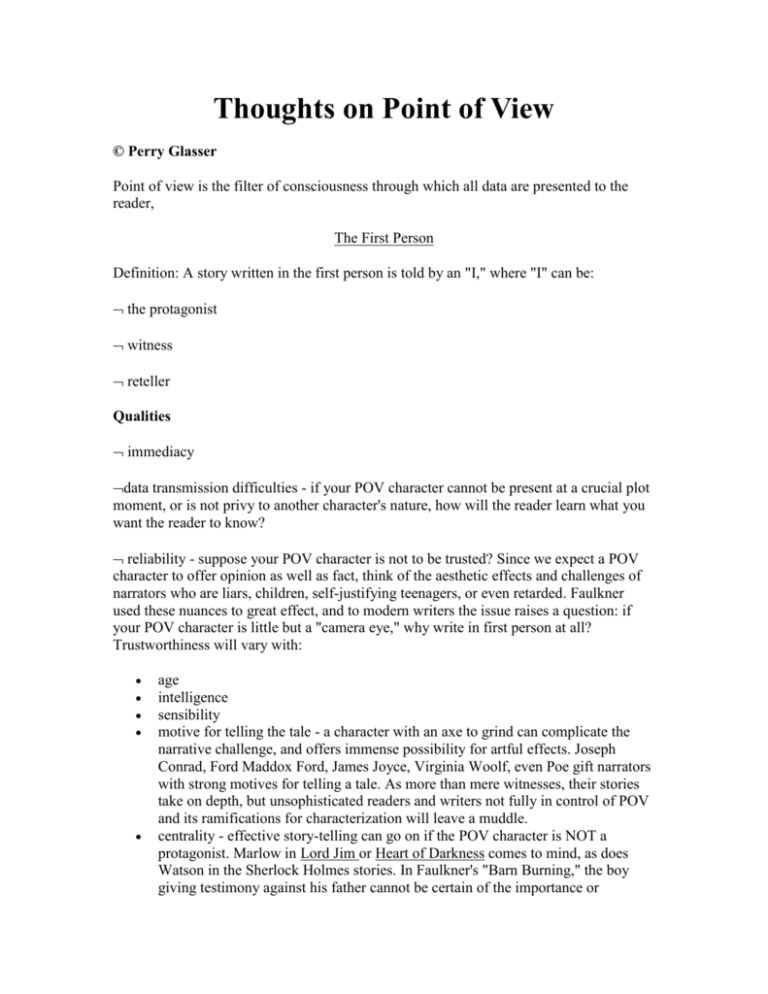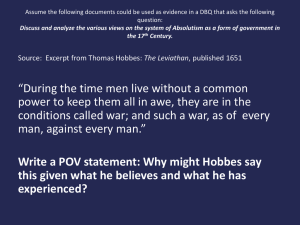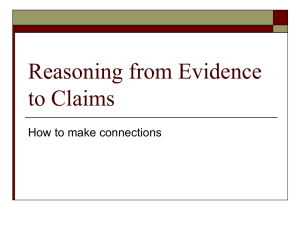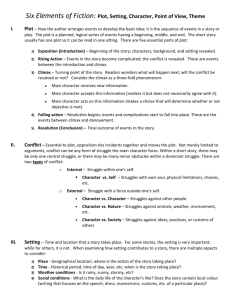Thoughts on Point of View
advertisement

Thoughts on Point of View © Perry Glasser Point of view is the filter of consciousness through which all data are presented to the reader, The First Person Definition: A story written in the first person is told by an "I," where "I" can be: the protagonist witness reteller Qualities immediacy data transmission difficulties - if your POV character cannot be present at a crucial plot moment, or is not privy to another character's nature, how will the reader learn what you want the reader to know? reliability - suppose your POV character is not to be trusted? Since we expect a POV character to offer opinion as well as fact, think of the aesthetic effects and challenges of narrators who are liars, children, self-justifying teenagers, or even retarded. Faulkner used these nuances to great effect, and to modern writers the issue raises a question: if your POV character is little but a "camera eye," why write in first person at all? Trustworthiness will vary with: age intelligence sensibility motive for telling the tale - a character with an axe to grind can complicate the narrative challenge, and offers immense possibility for artful effects. Joseph Conrad, Ford Maddox Ford, James Joyce, Virginia Woolf, even Poe gift narrators with strong motives for telling a tale. As more than mere witnesses, their stories take on depth, but unsophisticated readers and writers not fully in control of POV and its ramifications for characterization will leave a muddle. centrality - effective story-telling can go on if the POV character is NOT a protagonist. Marlow in Lord Jim or Heart of Darkness comes to mind, as does Watson in the Sherlock Holmes stories. In Faulkner's "Barn Burning," the boy giving testimony against his father cannot be certain of the importance or consequences, yet Faulkner manages to allow us to know all we need. His "A Rose for Emily" tells a strange tale, from the perspective of a never-defined "we," a perspective that in fact is privy to facts that no individual could ever know. voice - the personality of the POV- character will alter factors of style diction - language, metaphor, etc. must be appropriate to the POV character tone - since tone is defined as the author's attitude toward the work--sarcasm, irony, etc-- then a POV character who is a stand-in for the author begs the question: why are we in first person? Changing first person narration presents special challenges and opportunities. Alternating chapters with POV is mechanistic, but can be effective. Altering POV in short work is, however, simply disconcerting and disorienting to a reader, ruinous to the fictive illusion. The Second Person Definition: “you.” This point of view is rare because it is logically insufficient. The reader becomes the object of direct address and my not be persuaded by the data transmission aspect of story telling. Jay McInerny hazards this in Bright Lights Big City, a not altogether satisfactory novel. The Third Person Definition: A story written in third person refers to “he” or “ she” while the narrator is not a character in the tale. Qualities omniscience – data transmission has no boundaries; we move from mind to mind or from place to place with the ease of a quick transitional phrase. "Meanwhile, way across town, ...." varying psychological distance - "flat" 3rd person POV will lose contemporary readers who need to move in and out of the action. (see the sample passages below, especially Crime and Punishment. effaced narration - an innovation by Henry James, this mode of POV dominates contemporary letters. In it, all sensory data and normative judgments are in 3rd person, but they all come from a single consciousness. Thus, this POV has the qualities of 1st person without the ease of data transmission of 3rd person. Jmes believed that "art" flowed from discipline. beware of direct address - this is often called authorial intrusion, and while it was a staple of literature in the 18th century, in contemporary letters readers find it a disturbing distraction that ruins the fictive illusion. Put coarsely, if you want to write editorials and make pronouncements about people or politics, why the heck are you writing stories? Stop waving at your readers from behind the prose; if you want to send a message, call Western Union. Tip: If you are writing out of personal experience, try third person narration to give yourself "distance" on events. Samples: from: The Adventures of Hucklberry Finn, by Mark Twain - note how this 1st person narrator directly addresses the reader and how Clemens uses the diction and tone of an ill-educated 14-year old to great artistic purpose. YOU don't know about me without you have read a book by the name of The Adventures of Tom Sawyer; but that ain't no matter. That book was made by Mr. Mark Twain, and he told the truth, mainly. There was things which he stretched, but mainly he told the truth. That is nothing. I never seen anybody but lied one time or another, without it was Aunt Polly, or the widow, or maybe Mary. Aunt Polly -- Tom's Aunt Polly, she is -- and Mary, and the Widow Douglas is all told about in that book, which is mostly a true book, with some stretchers, as I said before. Now the way that the book winds up is this: Tom and me found the money that the robbers hid in the cave, and it made us rich. We got six thousand dollars apiece -- all gold. It was an awful sight of money when it was piled up. Well, Judge Thatcher he took it and put it out at interest, and it fetched us a dollar a day apiece all the year round -more than a body could tell what to do with. The Widow Douglas she took me for her son, and allowed she would sivilize me; but it was rough living in the house all the time..., Wuthering Heights by Emily Bronte - notice how the tone and diction of this novel's first narrator, Lockwood, differs from the tone and diction of Nelly, the novel's second narrator. It is a critical commonplace to note that Lockwood is a fool, a man unaware of the implications of what he sees and hears and reports to the reader, a man whose first act as an avowed hermit is to seek out his neighbor; some critics speculate that Nelly is not a disinterested narrator but may well have had feelings for Heathcliff herself, thus coloring the tale she tells to Lockwood (and to us). Chapter 1 1801. - I have just returned from a visit to my landlord - the solitary neighbour that I shall be troubled with. This is certainly a beautiful country! In all England, I do not believe that I could have fixed on a situation so completely removed from the stir of society. A perfect misanthropist's heaven: and Mr. Heathcliff and I are such a suitable pair to divide the desolation between us. A capital fellow! He little imagined how my heart warmed towards him when I beheld his black eyes withdraw so suspiciously under their brows, as I rode up, and when his fingers sheltered themselves, with a jealous resolution, still further in his waistcoat, as I announced my name. 'Mr. Heathcliff?' I said. A nod was the answer. 'Mr. Lockwood, your new tenant, sir. I do myself the honour of calling as soon as possible after my arrival, to express the hope that I have not inconvenienced you by my perseverance in soliciting the occupation of Thrushcross Grange: I heard yesterday you had had some thoughts - ' 'Thrushcross Grange is my own, sir,' he interrupted, wincing. 'I should not allow any one to inconvenience me, if I could hinder it - walk in!' Chapter 6 – Wuthering Heights - note how the dialogue is carefully punctuated. Nelly is reporting to Lockwood who is reporting to us a conversation reported to Nelly by Heathcliff that occurred between Heathcliff and Catherine (whew!). So the double and triple quotation marks are not typos! “‘Where is Miss Catherine?' I cried hurriedly. 'No accident, I hope?' 'At Thrushcross Grange,' he answered; 'and I would have been there too, but they had not the manners to ask me to stay.' 'Well, you will catch it!' I said: 'you'll never be content till you're sent about your business. What in the world led you wandering to Thrushcross Grange?' 'Let me get off my wet clothes, and I'll tell you all about it, Nelly,' he replied. I bid him beware of rousing the master, and while he undressed and I waited to put out the candle, he continued - 'Cathy and I escaped from the wash-house to have a ramble at liberty, and getting a glimpse of the Grange lights, we thought we would just go and see whether the Lintons passed their Sunday evenings standing shivering in corners, while their father and mother sat eating and drinking, and singing and laughing, and burning their eyes out before the fire. Do you think they do? Or reading sermons, and being catechised by their manservant, and set to learn a column of Scripture names, if they don't answer properly?' from “A Scandal in Bohemia,” by Sir Arthur Conan Doyle. Watson is a perfect idiot, perfect insofar as he hears, sees, and reports everything that befalls Sherlock Holmes, an idiot since he has the deductive power of a snail. Thus, Doyle created the aesthetic effect that created the modern detective story--we match wits with the detective to ascertain the truth of a mystery and what was inexplicable becomes explicable. Poe's "tales of ratiocination" are not half as graceful. To Sherlock Holmes she is always the woman. I have seldom heard him mention her under any other name. In his eyes she eclipses and predominates the whole of her sex. It was not that he felt any emotion akin to love for Irene Adler. All emotions, and that one particularly, were abhorrent to his cold, precise but admirably balanced mind. He was, I take it, the most perfect reasoning and observing machine that the world has seen, but as a lover he would have placed himself in a false position. He never spoke of the softer passions, save with a gibe and a sneer. They were admirable things for the observer -excellent for drawing the veil from men's motives and actions. But for the trained teasoner to admit such intrusions into his own delicate and finely adjusted temperament was to introduce a distracting factor which might throw a doubt upon all his mental results. Grit in a sensitive instrument, or a crack in one of his own high-power lenses, would not be more disturbing than a strong emotion in a nature such as his. And yet there was but one woman to him, and that woman was the late Irene Adler, of dubious and questionable memory. from Ivanhoe, By Sir Walter Scott - traditional 3rd person, note the vast sweep and scope of the omniscient prose. We see the world from the perspective of a god on high, a good height to be at for Scott's historical novels, necessary for the tale to shift time and place efficiently while not being bound to a single consciousness. In that pleasant district of merry England which is watered by the river Don, there extended in ancient times a large forest, covering the greater part of the beautiful hills and valleys which lie between Sheffield and the pleasant town of Doncaster. The remains of this extensive wood are still to be seen at the noble seats of Wentworth, of Warncliffe Park, and around Rotherham. Here haunted of yore the fabulous Dragon of Wantley; here were fought many of the most desperate battles during the Civil Wars of the Roses; and here also flourished in ancient times those bands of gallant outlaws, whose deeds have been rendered so popular in English song. Such being our chief scene, the date of our story refers to a period towards the end of the reign of Richard I., when his return from his long captivity had become an event rather wished than hoped for by his despairing subjects… from Chapter 7 of Crime and Punishment, by Fyodor Dostoevsky. This 19th century novel that predates Henry James' "Preface to The Ambassadors" (an essay graduate students may wish to read wherein James puts forth his aesthetic reasoning that codified effaced narration) makes dramatic use of varying psychological distance. Note how the early sentences of this passage keep us far from Raskolnikov's mind, but as panic sets in and he goes "blood simple" after committing a double axe murder, we move closer and closer into his mind, sentences get shorter and shorter, and the tone and diction move us closer and closer to the mind of a killer. Fear gained more and more mastery over him, especially after this second, quite unexpected murder. He longed to run away from the place as fast as possible. And if at that moment he had been capable of seeing and reasoning more correctly, if he had been able to realize all the difficulties of his position, the hopelessness, the hideousness and the absurdity of it, if he could have understood how many obstacles and, perhaps, crimes he had still to overcome or to commit, to get out of that place and to make his way home, it is very possible that he would have flung up everything, and would have gone to give himself up, and not from fear, but from simple horror and loathing of what he had done. The feeling of loathing especially surged up within him and grew stronger every minute. He would not now have gone to the box or even into the room for anything in the world. But a sort of blankness, even dreaminess, had begun by degrees to take possession of him; at moments he forgot himself, or rather, forgot what was of importance, and caught at trifles. Glancing, however, into the kitchen and seeing a bucket half full of water on a bench, he bethought him of washing his hands and the axe. His hands were sticky with blood. He dropped the axe with the blade in the water, snatched a piece of soap that lay in a broken saucer on the window, and began washing his hands in the bucket. When they were clean, he took out the axe, washed the blade and spent a long time, about three minutes, washing the wood where there were spots of blood rubbing them with soap. Then he wiped it all with some linen that was hanging to dry on a line in the kitchen and then he was a long while attentively examining the axe at the window. There was no trace left on it, only the wood was still damp. He carefully hung the axe in the noose under his coat. … He stood and gazed and could not believe his eyes: the door, the outer door from the stairs, at which he had not long before waited and rung, was standing unfastened and at least six inches open. No lock, no bolt, all the time, all that time! << is that author or the character? The old woman had not shut it after him perhaps as a precaution. But, good God! Why, he had seen Lizaveta afterwards! And how could he, how could he have failed to reflect that she must have come in somehow! She could not have come through the wall! He dashed to the door and fastened the latch.









